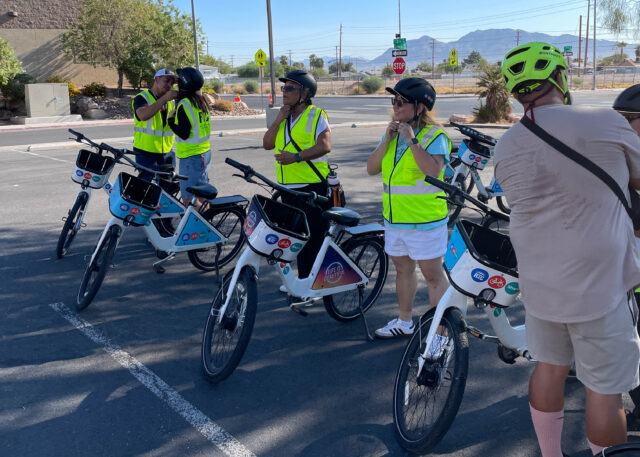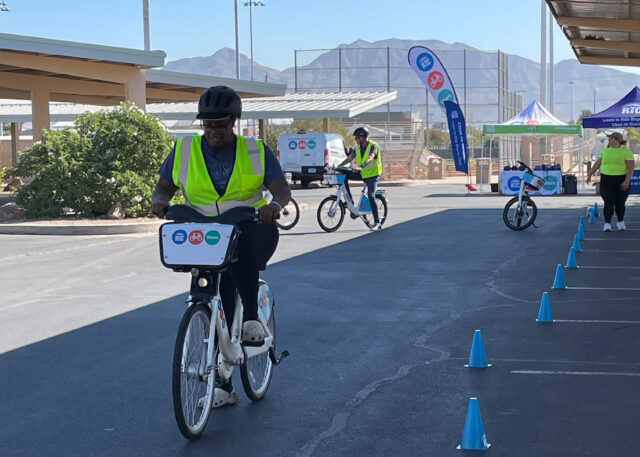Bike Clinics Expand Access to Bike Share in East Las Vegas
by Odochi Akwani, Writer and Content Manager
February 20, 2025
As bike share expands eastward from downtown Las Vegas, the Regional Transportation Commission of Southern Nevada and Bicycle Transit Systems are teaming up to educate new riders.

As Las Vegas’ RTC Bike Share expands eastward, a new challenge emerges — ensuring that all communities feel empowered to take advantage of this transportation option. To bridge the gap, the Regional Transportation Commission of Southern Nevada (RTC) and Bicycle Transit Systems (BTS) launched a series of bilingual bike clinics designed to introduce residents to bike share and build confidence in using the local system. Through targeted outreach and hands-on education, these clinics are about access and reshaping how people move throughout Las Vegas.
“We’ve heard [people] consistently asking for mobility solutions other than the vehicle. This investment was needed and wanted, but the perception of bike share could be viewed as not for everybody,” says Daniel Fazekas transportation planning manager at RTC. “So, with that investment into the east side, we knew that the population is much higher when it comes to Spanish-speaking. This grant helped us purchase materials in both English and Spanish and then develop a program — recognizing that we want to encourage everyone, Spanish-speaking or English-speaking, to take part in this training.”
The first bike share station in east Las Vegas was near The Center, an LGBTQ+ community center open to all. After that, RTC Bike Share deployed four other stations around bus stops or in commercial areas. The latest station is at the East Las Vegas Community Center, which primarily works with Spanish-speaking, first-generation Americans, according to Fazekas.
Fazekas credits BTS for identifying this grant as a solution to connecting with new riders several months before the expansion into the east.
“BTS staff including Liliana Lopez said, ‘We’ll take it. We’ll take it on.’ They learned the run of the show and they ran it, which was very beneficial to have that expertise,” says Fazekas.
The bike clinics were promoted through word of mouth at the two community centers as well as on social media. RTC utilized incentives to recruit participants including offering three-month bike share passes, three days of free bus passes, and free bike helmets, safety vests, and bike lights.
Between September and November 2024, RTC hosted four bilingual bike clinics introducing residents to bike share. At each event, RTC Bike Share set up a booth stocked with backpacks filled with helmets, informational materials on free passes, and other bike-related essentials. Participants were first fitted with safety vests and helmets before beginning a 90-minute session that combined hands-on education with a guided bike course. To ensure accessibility, all clinics were led by Spanish-speaking BTS staff.

“People were thankful to have a program that took the time to teach them,” says Liliana Lopez general manager at BTS operating RTC Bike Share. “Spanish speakers in particular, were grateful to have someone who connected with them on a cultural level. Most, if not all, participants were thankful to have just that dedicated person to walk them through how to ride a bike, how the program worked, and knowing how to utilize the system after leaving the event.”
RTC acknowledges the challenges faced during the planning of the clinics and sees them as opportunities for improvement. Fazekas hopes to build on these lessons to refine and expand future events.
“What we would do next time is more tabling at the community centers, so just not using emails or QR codes, but hustling to get out and get people to sign up,” says Fazekas. “Recognizing that it’s still adults, there is probably kind of this embarrassment level. So, figuring out how to get people to feel comfortable to participate.”
Strengthening partnerships with community centers will be a key strategy moving forward. RTC recognized the value of engagement and aims to collaborate more closely with local organizations.
“[We hope to] establish either monthly or quarterly clinics at those locations, so people know that this is the day, or this is the weekend where they do clinics,” says Fazekas. “So, eventually people will just see it and join.”
As RTC and BTS reflect on the success of these bike clinics, they recognize that expanding access is an ongoing process — one that requires consistent community engagement. With plans to establish regular clinics and deepen partnerships with local organizations, the goal is to make RTC Bike Share a familiar and accessible transportation option for all. For many participants, the clinics didn’t just teach them how to ride — they opened up a new way to navigate their city.
“Vegas is still very new, so a lot of its infrastructure is still growing, and so being able to be a part of that process and providing these services is the first and foremost most important part,” says Lopez. “And second, providing it to different communities that may not have access to certain modes of transportation has been super amazing. It’s been great to see people excited about knowing a new way to get around some of the comments that I received were that they didn’t realize that this was an option for them, and it was great to walk them through what their now daily commute can look like, versus the struggles that they’re going through.”
____________________________________________________________________________________________
The Better Bike Share Partnership is funded by The JPB Foundation as a collaboration between the City of Philadelphia, the National Association of City Transportation Officials (NACTO), and the PeopleForBikes Foundation to build equitable and replicable bike share systems. Follow us on LinkedIn, Facebook, Twitter, and Instagram, or sign up for our weekly newsletter. Have a question or a story idea? Email odochi@peopleforbikes.org
